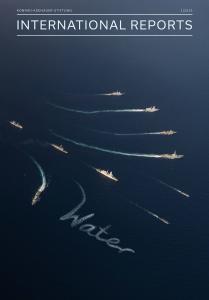Issue: 1/2025
Dear Readers,
“Water” is a concise title, but one that covers a vast range of topics in the present issue of International Reports. The opening article highlights the many different dimensions of this theme from a foreign policy perspective: In their analysis of EU water policy, Olaf Wientzek and Nicole Linsenbold reveal how water plays at least three distinct roles that subsequently re-appear throughout this issue – namely the roles of water as an ecosystem, as a resource and as a conflict arena.
Water as a conflict arena: The world’s oceans are arenas of international disputes. In their article, Ferdinand Gehringer and Matthias Hespe illuminate how critical maritime infrastructure – such as undersea data cables – has increasingly become a target of Russia’s hybrid warfare against European states, particularly in the Baltic Sea. In order to counter this threat, the authors argue that the countries concerned should not only strengthen the protection of this infrastructure, but also invest in redundant capacities.
Tensions in the South China Sea may currently be the most prominent example of the contestation of maritime territories themselves, with various actors competing for control. In their contribution, Daniela Braun and Florian Feyerabend examine the different strategies being used by the Philippines and Vietnam to push back against China’s expansive and increasingly aggressive claims in the region.
Water as a resource: Water is essential for life. It is a fundamental requirement for agriculture and is a key factor in certain industries. When water becomes scarce, as during droughts, the consequences can be catastrophic. Around one third of the world’s population currently lacks secure access to drinking water, and this “water stress” is only expected to worsen in light of climate change. However, while wars over water have often been predicted in recent decades, they have yet to materialise.
Nonetheless, fluctuations in water availability can certainly fuel local and domestic conflicts. In his article, Ulf Laessing vividly describes how climate change in the Lake Chad region is playing into the hands of jihadist groups such as Boko Haram and the so-called Islamic State: “There is either too little rain in the region or far too much”, Laessing writes. The consequence: People who rely on farming are finding it increasingly difficult to make a living, which in turn makes them more susceptible to recruitment by terrorists, for whom Lake Chad provides a virtually ideal environment in which to operate. Once a vast body of water in the mid-20th century, the lake shrank dramatically for decades before its water levels began rising again around the turn of the millennium. The result is a fragmented landscape of islands that local militaries struggle to control.
At the international level, water scarcity has tended to drive cooperation at least as much as it has fuelled tensions: Indeed, the Council on Foreign Relations has recorded more than 300 international water agreements since 1948. One example of how cooperation in the area of water management can endure even during politically difficult times can be found in the partnership between Israel and Jordan, which Edmund Ratka and Michael Rimmel examine in their article. Thanks to innovation and modern technology, Israel is able not only to supply its own population and economy with water, but also to provide for its neighbour Jordan. At the same time, the article clearly demonstrates that water cooperation between the two countries forms part of a complex web of relations and is by no means immune to shifts in these countries’ bilateral ties: Indeed, water can be used both as a tool for easing tensions and as a means of applying political pressure.
Water as an ecosystem: Water – and especially the ocean – is a vast habitat, an ecosystem whose well-being is a global public good in the same way as is a stable climate. Protecting that good requires both national efforts and international cooperation. In her contribution, Julia Sandner explores this notion based on the example of Costa Rica, a country with a “green” reputation that has nonetheless seen some setbacks in marine conservation, though Costa Rica continues to play an active role on the international stage, not least as co-host of this year’s UN Ocean Conference.
Ecosystem, resource, conflict arena: Water is relevant to international politics in highly diverse ways. As all three of these aspects are important, Germany and its European partners should engage with them both in the interest of fair global solutions and in pursuit of their own strategic goals. There are some particularly urgent challenges, however, chief among which is certainly maritime security, which has been coming under increasing threat – both above and below water – from revisionist autocratic states. Countering this threat will demand significant efforts and financial resources in the years ahead. We Europeans should not lose sight of the challenges posed by China in this regard. However, in the maritime sphere, as in other areas, the stance of the current US administration may push Europe to focus even more on its immediate neighbourhood and on the threat posed by Russia.
I hope you find this report a stimulating read.
Yours,

Dr Gerhard Wahlers is Editor of International Reports, Deputy Secretary General and Head of the Department European and International Cooperation of the Konrad-Adenauer-Stiftung (gerhard.wahlers@kas.de).





